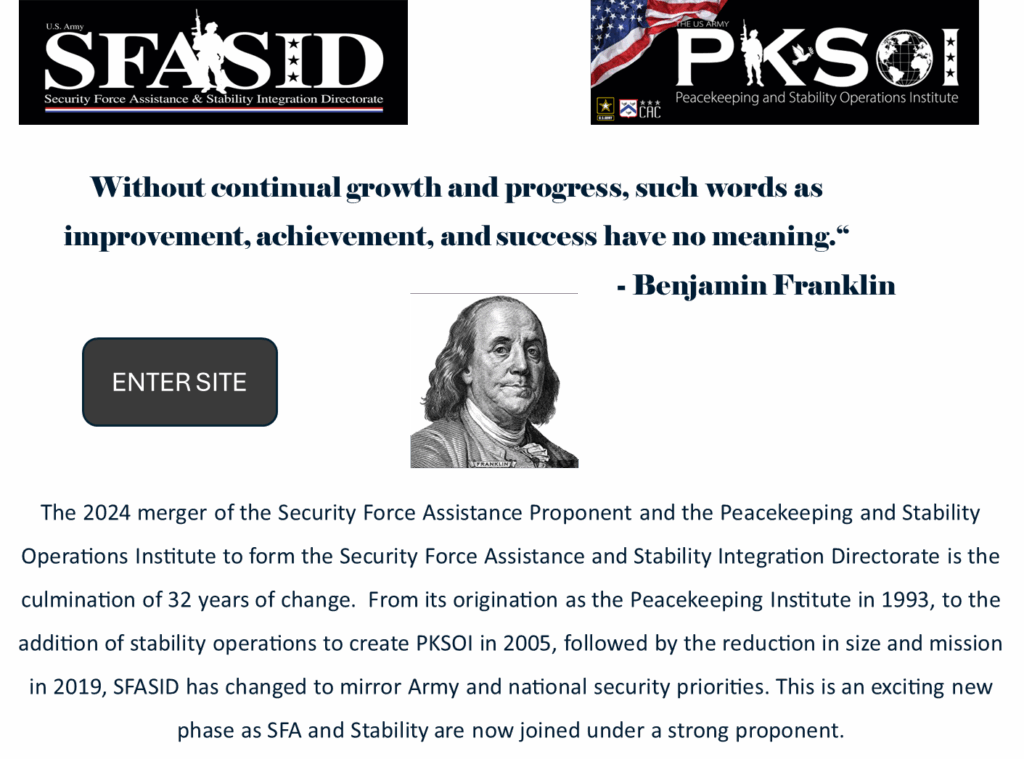US Global Stabilization Strategy for the COVID 19 Pandemic

By Dr. Raymond A. Millen and the PKSOI Team
8 April 2020
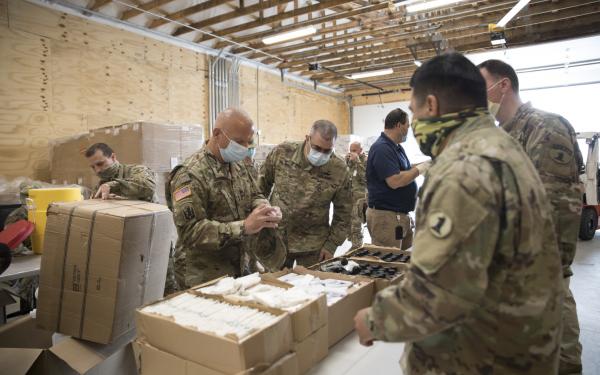
Photo by Sgt. Laura Michael
In the wake of the COVID 19 pandemic, the United States should continue to confirm its global leadership. As a global power and largest contributor of foreign aid ($47 billion to 212 countries), the United States possesses the international prestige and trust to provide direction in the aftermath of the pandemic. Accordingly, the United States must inspire worldwide action, provide strategic guidance for international responses, and coordinate the effort through various organizations, such as USAID.1 This paper, which is the second in a series focused on issues 0F surrounding COVID-19, addresses recommended US international messaging, planning considerations for global recovery, in order to utilize the core stability functions to engage the stabilization activities for countries impacted by the pandemic.
This PKSOI paper recommends that the US response to the pandemic, employing the existing integrated approach to stabilize areas most affected by COVID-19. As stated in Joint Publication 3-07 Stability, the five joint stability functions are security, foreign humanitarian assistance, economic stabilization and infrastructure, rule of law, and governance and participation. These functions reflect the US whole of government approach and are easily adjusted from a traditional response to one that focuses on the destabilizing factors caused by the virus and its effects on fragile nations. In order to optimize the effectiveness of US global leadership and stimulate global action, international messaging is essential.
International Messaging
U.S. international messaging must make the case for global cooperation in the recovery. As a global leader, the United State must adhere to the facts, not conjectures, regarding the origins of the pandemic. Through the international community, the United States should stress Chinese government accountability for its mishandling of the epidemic, its lack of transparency in warning the world, and its attempts to deflect blame. Since honor is a cultural imperative to China, the Chinese government can save face by making amends for its behavior. As such, the UN should advise the Chinese government to provide humanitarian assistance, financial relief, and/or debt forgiveness to countries affected by the pandemic.
US international messaging should encompass senior administration officials conducting interviews, news conferences, speeches, and other media platforms to underscore the facts behind the pandemic. US messaging should recount the continuing stabilization efforts of the US government, agencies, and NGOs before and during this pandemic and previous epidemics in other countries. Nonetheless, US messaging should stress that recovery requires international engagement and should include a request for the assistance of partners and donors (e.g., specific countries, international organizations, regional organizations, and NGOs). The US president and secretary of state should personally address the UN General Assembly for Chinese government accountability and a US proposal for international cooperation through a UN resolution. The crux of the UN resolution is not censure or sanctions against China, but direct compensation for the global harm it has inflicted. Since countries affected by COVID 19 suffered economically and expended large sums of money in response to the pandemic, they must demand financial compensation and direct humanitarian assistance from China. If China does not respond appropriately, injured countries can unilaterally nullify their debts to China, citing the UN resolution as the legal right.
Planning Considerations for Global Recovery
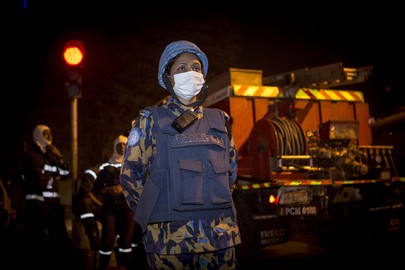
Photo by Harundune Dicko
The US stabilization strategy must be pragmatic, focused, and measured. Developed countries with resilient medical services, infrastructure, and government institutions can handle the epidemic with available resources. If extra assistance is required, regional organizations can provide it: EU/NATO, Organization of American States, Asia Pacific Economic Cooperation, Association of Asian Pacific Community Health Organizations, African Union, etc. Nations should offer assistance to afflicted countries, with which they have historic relations (e.g., colonial or traditional). From a global stability perspective, the United States should focus its assistance to geostrategic-important countries hit by the pandemic. In order to minimize redundancies and untapped resources, the United States and global partners should address a division of responsibility concerning unique capabilities (e.g., logistics, medical, organizational, transportation, and humanitarian assistance/disaster response). These actions should complement and strengthen extant UN resolutions and plans regarding the COVID 19 pandemic.
The United States should encourage charities, clubs, and associations to donate needed supplies, funds, and people, perhaps in coordination with USAID and other government agencies. These organizations may be of greater use after the emergency to help stricken communities recover. It is important to stress that continued charitable assistance is required after major government measures cease. Charitable donations and government assistance to NGOs working in debilitated countries are efficient ways to provide immediate and continued care to suffering people.
Overview of Shifts in Stability Functions
Assisting countries and organizations should focus on specific stabilization activities for fragile countries affected by COVID 19. Deploying personnel must receive relevant immunizations and influenza tests prior to departure, as well as training on proper techniques to prevent viral spread. The United States and partner countries should make a collective effort to insure these items are available during preparation for overseas deployment. Deployed personnel must be tested before returning to their home countries and isolated for the entirety of the possible incubation period as well.
Assisting nations should conduct a stabilization assessment of each country (embassy country teams should provide the data) in order to tailor the response: security, foreign humanitarian assistance, economic stabilization and infrastructure, rule of law, and governance and participation. The priority and level of assistance for each stabilization task is predicated on the degree of damage to individual states and their economic development prior to the pandemic.
Joint Stability Function One
Establishing or maintaining security is imperative to prevent looting and immediate crime. Military forces and international police may need to support local police and military services devastated by the pandemic. For most emergencies, the host nation government may need to impose curfews and other restrictions. The host nation government should only impose martial law as the last resort. The local police must devote particular attention to the prevention of hoarding and the black market. Failure to do so not only undermines the rule of law, but also impedes economic recovery. The main focus is to minimize criminal activity and corruption (black market of need supplies).
Joint Stability Function Two
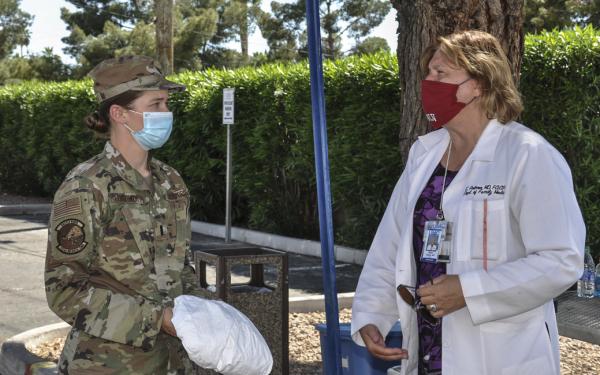
Photo by: Staff Sgt. Ryan Getsip
Resuming essential services requires a prioritized response, which can be accomplished through foreign humanitarian assistance. Medical assistance is the highest priority to prevent societal collapse. While support to existing hospitals and clinics is recommended, assisting countries should be prepared to establish field hospitals and testing sites in order to lighten the burden on host nation medical services. Assistance personnel need to organize body recovery, transportation, and burial details for victims. Since many victims often die in their homes, this activity will take time. In areas experiencing high numbers of deaths, mass burials may be required to prevent the spread of disease. Assistance personnel must test and purify water to prevent water borne diseases, such as cholera and dysentery. The resumption of waste disposal is required to prevent rodent infestation and vector diseases. The provision of food and shelter may be required, depending on the extent of breakdown to the local communities. The resumption of energy (e.g., electricity, gas, coal, and wood) is needed for the cooking of food and purification of water. Assistance personnel should optimize existing transportation, perhaps organizing transportation pools, to include POL points and maintenance, to assist in the resumption of essential services.
Joint Stability Function Three
Economic recovery requires prioritization as well, through economic stabilization and infrastructure. Assistance for food production may vary depending on the local circumstances. Farmers may need assistance with harvesting and transportation of products to the market. At times, host governments may order the killing of livestock, such as chickens and pigs, since they may be influenza carriers, so providing replacements and veterinary assistance will preserve that market. Fishermen may need assistance with fuel and equipment repairs (nets, engines, and boats). With these basic needs attended as well, economic recovery in other sectors will proceed in due course.
Joint Stability Functions Four and Five
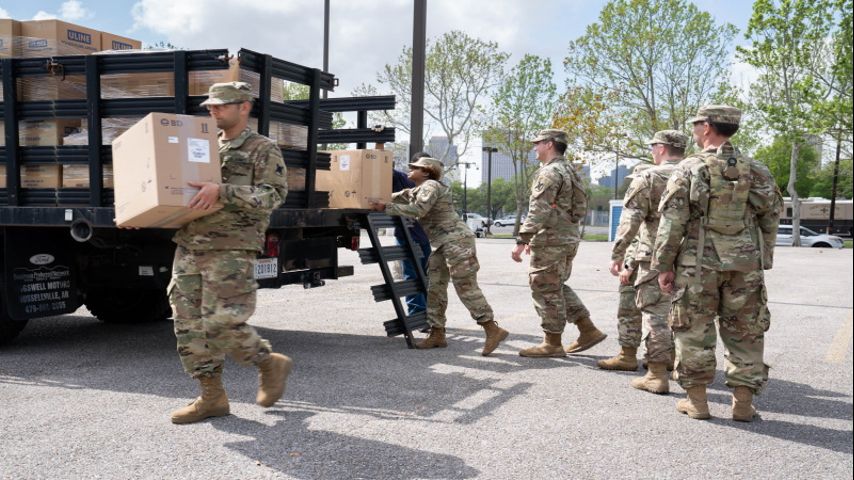
Photo by: Capt. Brenda Mackie
Advisory assistance to governance and civil control is indispensable. Advisors must work through the local officials to maintain their authority with the populace. While assistance personnel may need to provide funding and resources, the local authorities should dispense them. Indirect governing is the most effective way to interact with political, police, fire, medical, and other essential personnel. In order to preserve self-worth and dignity, assistance should never appear as charity. Hence, working through local government is paramount. This action provides legitimacy to the local, regional, and national government structures.
Conclusions
U.S. international prestige rests on encouraging international cooperation and direction as a global leader. The United States must demonstrate that even in a pandemic, it continues to display empathy to all inflicted countries and strong resolve in meeting this crisis. US actions speak louder than Chinese disinformation. Everyone matters, or no one matters. Shifting the five joint stability functions permits the United States to use existing infrastructure to empower desires end states: specifically, to achieve security, provide humanitarian assistance, ensure economic stabilization, promote rule of law, and encourage good governance and participation. This targeted systematic response to the pandemic not only allows the United States to use existing infrastructures but also to continue to be the global leader.
As a global leader in the pandemic recovery, the United States understands that concerted response bolsters global security. Global recovery ensures that US security cooperation activities continue unabated to ensure fragile states do not collapse from internal or external threats. The United States must ensure that both fragile states and trade partners recover quickly in order to maintain stability in critical regions and preserve the rights of states to freely transit the global commons (Preparing for the National Security Strategy 2020 and Beyond).
